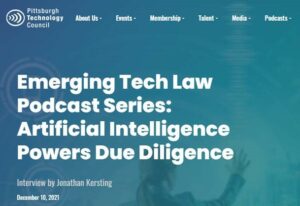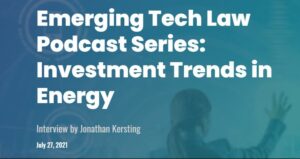As the development of artificial intelligence systems accelerates globally and the benefits and risks of their use become evident, calls for government regulation in the U.S. and abroad have accelerated. In this Alert, Attorneys Susanna Bagdasarova, Mary Binker, Christian Farmakis and Justine Kasznica discuss two significant governmental developments that occurred in the past month to respond to these calls. …
- People
- Practices
- Aerospace, Aviation & Airports
- Construction
- Corporate & Commercial
- Emerging Technologies
- Employment & Labor
- Energy & Natural Resources
- Environmental
- Litigation
- Pipeline & HazMat Safety
- Public Sector
- Real Estate, Land Use & Zoning
- Transportation Technology & Energy
- Solvaire – Diligence, Discovery & Document Management
- Perspectives
- Firm
- DE&I
- Make a Payment







 On this episode of the Emerging Tech Podcast Series, we talk to Justine Kasznica and Ashleigh Krick of Babst Calland’s Emerging Technologies Group about the latest cybersecurity threats centered on the energy industry.
On this episode of the Emerging Tech Podcast Series, we talk to Justine Kasznica and Ashleigh Krick of Babst Calland’s Emerging Technologies Group about the latest cybersecurity threats centered on the energy industry. On August 13, 2021, the National Highway Traffic Safety Administration’s (NHTSA) Office of Defect Investigations (ODI) opened a Preliminary Evaluation (
On August 13, 2021, the National Highway Traffic Safety Administration’s (NHTSA) Office of Defect Investigations (ODI) opened a Preliminary Evaluation ( In this episode of the Emerging Tech Podcast Series,
In this episode of the Emerging Tech Podcast Series,